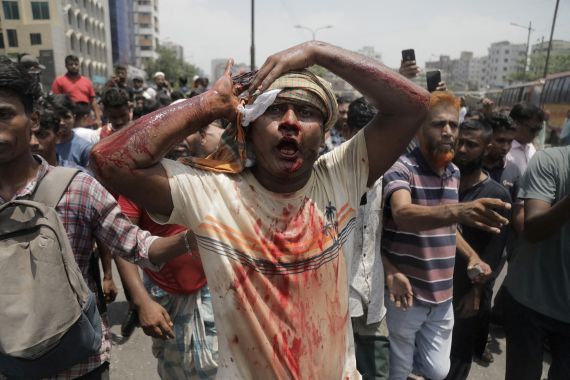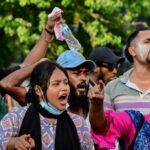Bangladesh’s quota issue involves the reservation of government jobs and educational seats for specific groups. It sparks debates over fairness and meritocracy.
The quota system in Bangladesh aims to ensure representation for marginalized groups. It reserves seats in government jobs and educational institutions for women, ethnic minorities, and freedom fighters’ descendants. Supporters argue that it helps address historical injustices and promotes inclusivity.
Critics claim it undermines merit-based competition and favors certain groups over others. The issue remains contentious, with many calling for reforms to balance equity and merit. Understanding this complex issue requires examining its impact on society, policy, and the lives of those affected.

Credit: en.wikipedia.org
Historical Context
The quota system in Bangladesh has roots in its historical and political backdrop. It has been a topic of both support and debate for decades. Understanding the historical context is essential to grasp the current issues surrounding the quota system.
Origins Of The Quota System
The quota system in Bangladesh originated in the early 1970s. After gaining independence in 1971, the government aimed to ensure representation across various sectors. The system was introduced to provide opportunities to underrepresented groups. This included freedom fighters, women, and ethnic minorities. The goal was to create a more inclusive society.
Key Milestones
- 1972: The quota system was officially implemented.
- 1985: The system was revised to include district quotas.
- 1997: Quotas for women were increased to promote gender equality.
- 2018: Massive student protests led to a review of the quota system.
Over the years, the quota system has seen numerous changes. These changes aimed to address the evolving needs of society. Yet, the system has also faced criticism and calls for reform.
| Year | Event |
|---|---|
| 1972 | Implementation of the quota system |
| 1985 | Introduction of district quotas |
| 1997 | Increase in women’s quotas |
| 2018 | Student protests and review of the system |
The quota system’s history is marked by significant events. These events shaped the direction and implementation of the system. Understanding these milestones is crucial to comprehending the current debates.
Current Quota Structure
The current quota structure in Bangladesh addresses the needs of various groups. It ensures fair representation in public sector jobs and educational institutions. The system aims to support underrepresented and disadvantaged communities.
Categories Of Quotas
The quota system is divided into several categories:
- Freedom Fighters’ Quota: Reserved for descendants of those who fought for independence.
- Women’s Quota: Designed to promote gender equality in the workforce.
- Ethnic Minorities’ Quota: Supports the inclusion of indigenous communities.
- Disabled Persons’ Quota: Provides opportunities for individuals with disabilities.
- District Quota: Ensures representation from less developed regions.
Distribution Mechanism
The distribution mechanism of quotas is carefully structured:
| Category | Percentage |
|---|---|
| Freedom Fighters’ Quota | 30% |
| Women’s Quota | 10% |
| Ethnic Minorities’ Quota | 5% |
| Disabled Persons’ Quota | 1% |
| District Quota | 10%</td |
Each category has a fixed percentage of reserved seats. These percentages help maintain a balanced representation across different groups.
This structured approach ensures that all communities get a fair chance in public sector jobs and educational institutions.
Public Reaction
The quota issue in Bangladesh has sparked widespread public reaction. People from all walks of life have voiced their opinions. This issue has led to significant social movements and debates.
Protests And Movements
In response to the quota system, students organized massive protests. These protests took place in major cities. Dhaka saw the largest gatherings. Protesters demanded changes to the existing quota system. They felt it was unfair and needed reform.
The movement gained momentum quickly. Social media played a crucial role in this. Activists used platforms like Facebook and Twitter to spread their message. They called for justice and equality.
The government faced pressure from these protests. Eventually, some changes were promised. Yet, the protests continued. People wanted more substantial reforms.
Voices Of Support And Opposition
The quota issue has divided public opinion. Some people support the current system. They believe it ensures representation for marginalized groups. They argue it helps level the playing field.
On the other hand, many oppose the quota system. They feel it is outdated and unfair. They argue it limits opportunities for meritorious candidates.
Here is a table summarizing the key arguments:
| Supporters’ Arguments | Opponents’ Arguments |
|---|---|
| Ensures representation for marginalized groups | Limits opportunities for meritorious candidates |
| Levels the playing field | Considered outdated |
| Promotes social justice | Seen as unfair |
Debates continue both online and offline. People express their views in various forums. The quota issue remains a hot topic in Bangladesh.

Credit: www.aljazeera.com
Political Implications
The quota issue in Bangladesh has far-reaching political implications. It impacts government policies and the country’s political landscape. This section delves into the government stance and the opposition parties’ views.
Government Stance
The Bangladesh government supports the quota system. They believe it promotes social equality. The system reserves jobs for marginalized groups.
- Prime Minister: Advocates for quotas to uplift underprivileged communities.
- Ministers: Often highlight the historical importance of quotas.
- Policies: Focus on maintaining and sometimes expanding the quota system.
Government officials argue that the quota system reduces social disparities. They also believe it ensures representation in government jobs.
Opposition Parties’ Views
Opposition parties have different views on the quota issue. They often criticize the current system. They argue it is outdated and unfair.
- Leading Opposition Party: Calls for a merit-based system.
- Youth Wings: Organize protests against the current quota system.
- Policy Proposals: Suggest reforms to limit or remove quotas.
Opposition leaders argue that the quota system creates inequality. They also believe it demotivates talented individuals.
Economic Impact
The quota system in Bangladesh has far-reaching economic implications. This section delves into how the quota issue affects employment and economic growth. Understanding these impacts is crucial for addressing the broader challenges facing the nation.
Effects On Employment
The quota system influences the job market significantly. Many jobs are reserved for specific groups. This means that not everyone gets an equal chance. The private sector often prefers merit-based hiring. But the public sector follows quota rules. This creates a divide in employment opportunities.
Furthermore, the quota system can lead to a mismatch of skills. Some groups may get jobs without the necessary qualifications. This impacts productivity and efficiency at work. The overall quality of the workforce may decline.
| Sector | Quota Impact |
|---|---|
| Public | Quota-based hiring |
| Private | Merit-based hiring |
Implications For Growth
The quota system affects economic growth in various ways. It can lead to inefficiencies in the labor market. When jobs are not filled based on merit, productivity suffers. This impacts the overall economic output of the country.
Investment in skill development may decline. Companies may not invest in training if they rely on quotas. This can lead to a less skilled workforce. As a result, the economy may grow at a slower rate.
- Lower productivity
- Reduced investment in skills
- Slower economic growth
In summary, the quota system has significant economic impacts. It affects both employment and growth. Addressing these issues is essential for Bangladesh’s future.
Social Consequences
The quota system in Bangladesh has long been a topic of heated debate. It impacts various facets of society, including social mobility and intergroup relations. Understanding the social consequences is crucial to grasp the full picture of this issue.
Impact On Social Mobility
The quota system can hinder social mobility for many people. It allocates a significant portion of government jobs and educational seats based on categories like region, gender, and ethnicity. This often leaves fewer opportunities for those outside these categories.
Many argue that this leads to a meritocracy problem. Talented individuals might miss out on opportunities, which could cause frustration and disillusionment. Here’s a breakdown of the impact:
- Reduced Opportunities: Limited seats for general category students.
- Increased Competition: Higher competition for fewer open spots.
- Economic Disparity: Economic barriers can become more pronounced.
Intergroup Relations
The quota system can also affect intergroup relations. It can create a sense of division among different communities. People may feel that certain groups are unfairly advantaged or disadvantaged.
This often leads to social tension and resentment. Different groups may start to view each other with suspicion or hostility. Below are some key points on how intergroup relations are impacted:
- Social Tension: Increased feeling of unfairness among groups.
- Resentment: Groups may feel others are getting undue advantages.
- Lack of Unity: Divisive policies can weaken national unity.
Addressing these issues is essential for a more equitable society. The goal should be to balance merit and opportunity while fostering social harmony.
Future Prospects
The quota system in Bangladesh has been a topic of much debate. Understanding the future prospects involves looking at potential reforms and long-term solutions. These changes could shape the country’s socio-economic landscape.
Potential Reforms
Reforms are necessary to address the issues within the quota system. Here are some potential reforms that could be considered:
- Reduction in Quota Percentage: Reducing the percentage reserved for quotas can ensure more open competition.
- Merit-Based Adjustments: Making adjustments to favor merit over other criteria.
- Periodic Reviews: Regularly reviewing the quota system to address current needs.
These reforms can create a more balanced and fair system. Students and job seekers would benefit from a transparent process.
Long-term Solutions
Long-term solutions are essential for sustainable development. Here are some possible long-term strategies:
- Educational Reforms: Improving education quality to reduce the need for quotas.
- Economic Development: Boosting the economy to create more jobs and opportunities.
- Social Awareness: Promoting social awareness to reduce dependency on quotas.
Implementing these solutions requires commitment from all stakeholders. Achieving these goals will take time and effort.
| Strategy | Impact |
|---|---|
| Educational Reforms | Reduces dependency on quotas |
| Economic Development | Creates more job opportunities |
| Social Awareness | Promotes equality and fairness |
Each of these long-term solutions targets a specific area of improvement. Together, they can lead to a more equitable society.

Credit: www.npr.org
Conclusion
The quota issue in Bangladesh remains a complex and debated topic. Understanding its history and implications is crucial. This issue affects various aspects of society, including education and employment. Ongoing discussions aim to find a fair and balanced solution. Stay informed to grasp the evolving landscape of this significant matter.



